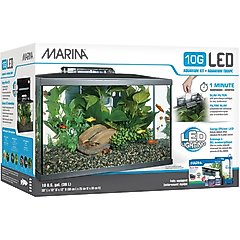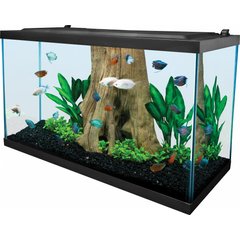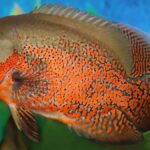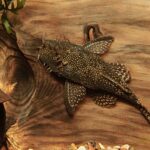How Common Are Pet Fish Parasites? Understanding How to Keep Your Fish Healthy
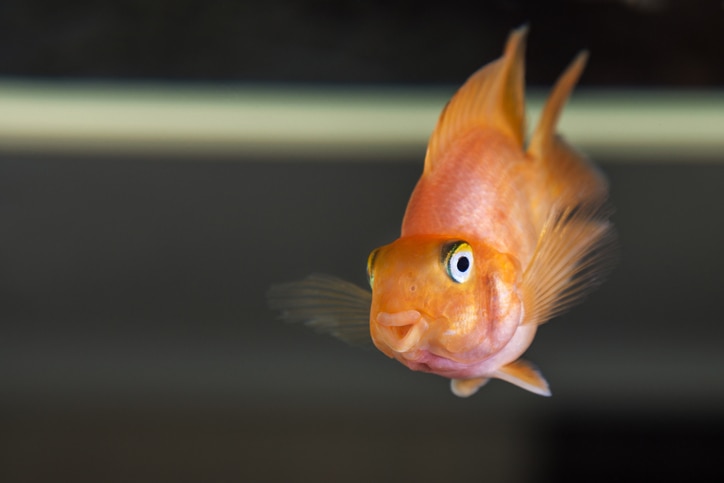
Photo by v_zaitsev/iStock/Getty Images Plus
It might seem surprising, but parasites exist in most aquariums and can even be found on healthy fish.
It’s generally only when pet fish get stressed out or are dealing with poor water quality in their tank that parasitic infestations become problematic. Here’s how to keep your fish in top shape.
Key Takeaways:
- It’s common for fish to have parasites with no harmful effects.
- Parasites are most likely to thrive when a fish’s immune system has been weakened by stress.
- It can be difficult to tell which kind of parasite a pet fish has, so it’s essential to speak with a vet.
What Are Fish Parasites?
Parasites are organisms that require a living host to survive and spread. Ectoparasites, or external parasites, live on the outside of the host body—usually on the fish’s skin, scales, gills, and fins. Endoparasites, or internal parasites, inhabit the blood, tissues, and/or organs of the infected fish.
“Fish can contract a variety of internal and external parasites through contact with infected water sources, shared equipment, or via contact with other fish,” says Dr. John Mastrobuono, a staff veterinarian at The Florida Aquarium in Tampa. Most parasites are contagious, he adds, and can be passed on to other fish through direct physical contact or exposure via fish poop.
Even if an infected fish doesn’t have symptoms, they can still shed parasites. In fact, it’s very common for fish to carry them without experiencing harmful effects, especially wild fish.
“All fish are susceptible to parasites,” says Dr. Mastrobuono.
9 Most Common Parasites in Pet Fish
The most common parasites for fish in captivity are external parasites, and they tend to thrive when a fish’s immune system has been weakened by stress. However, pet fish can also have internal parasites.
Parasites can lead to death, so it’s important to see a vet if you notice symptoms.
External Parasites
Ich (White Spot Disease)
One of the most common freshwater fish diseases, ich is also known as white spot disease. It’s caused by a protozoan parasite (Ichthyophthirius multifiliis) that spreads across the infested fish’s body, gills, and fins. In addition to the characteristic white spots, common symptoms include loss of appetite, low energy, and labored breathing.
Velvet (Gold Dust Disease)
Velvet is caused by a protozoan parasite that inhabits the skin and gills. Caused by Piscinoodinium in freshwater fish and Amyloodinium in marine species, velvet gives fish a dusty yellow appearance. Other symptoms may include rubbing against tank surfaces, loss of appetite, and low energy.
Marine Ich
In saltwater fish species, ich is caused by a ciliated protozoan parasite (Cryptocaryon irritans). It results in white spots on the fins and body and may cause labored breathing, rubbing against tank surfaces, and faded coloration.
Flukes
Gyrodactylus and Dactylogyrus are parasites called flukes that stick to the gills and skin. They are too small to see with the naked eye, but these microscopic parasites cause visible irritation. Infested fish may exhibit red spots, missing scales, increased mucus production, and rubbing against tank surfaces, as well as reduced activity and appetite.
Anchor Worms
Technically a parasitic crustacean, anchor worms burrow under the skin. The “worm” part that is most noticed is the worm’s female reproductive organ and, if removed, may not actually remove the attached parasite.
Fish Lice
Like anchor worms, fish lice are parasitic crustaceans, but they tend to remain on the outside of the body. Fish lice may be visible as tiny, disc-shaped creatures, and infestation may cause inflammation, rubbing against tank surfaces, or low energy. The most common lice in pet fish are Argulus species.
Internal Parasites
Head and Lateral Line Erosion
Sometimes caused by the Hexamita (also known as Spironucleus) protozoal parasite, head and lateral line erosion targets the intestinal tract. (It has many causes, some not related to parasites.) Infested fish may develop small holes on the body and head, along with skin lesions and a hollow-bellied appearance.
Tapeworms
Most common in wild-caught and newly imported aquarium fish, tapeworms are internal parasites that infest the digestive tract. Common symptoms include a swollen abdomen, loss of muscle, and difficulty swimming.
Roundworms
Also called nematodes, roundworms typically infest the digestive tract, swim bladder, and body cavity. In some cases, they can be seen protruding from the cloaca. The two most common roundworms seen in aquarium fish are the Camallanus and Capillaria species.
Does My Pet Fish Have a Parasite?
Identifying parasitic infestations can be particularly challenging. “Many of the signs are nonspecific,” says Robert Martinez, a certified aquatic veterinarian and owner of Aquatic Veterinary Consulting Services in Salt Lake City, Utah. “It can be difficult with the naked eye to differentiate between parasitic, bacterial, fungal, and viral infections.”
According to Dr. Martinez, some of the most common signs of external parasites in fish include:
- Increased mucus production
- Pale coloration
- Red streaks on the body
- Spots on the skin
- Nodules or lesions
- Visible parasites
- Rubbing against tank objects or surfaces
- Rapid breathing
- Low energy
- Decreased appetite
Internal parasites are less common for aquarium fish but can be even more difficult to identify. Symptoms may include:
- Abnormal stools
- An emaciated appearance
- Lethargic behavior
- Changes in appetite
- Parasites protruding from the anus or anchor points on the body
Are Fish Parasites an Emergency?
Fish parasites can spread very quickly and are unlikely to resolve on their own. Quarantining an affected fish enables you to administer targeted treatment, but if the infestation is already widespread, you may need to treat the entire tank.
Recommended Products
“Many parasites are life-threatening without treatment,” says Dr. Mastrobuono, but the wrong treatment can make matters worse. He strongly recommends consulting a certified aquatic veterinarian to identify the parasite and determine the best course of action.
You’ll also need to address any issues causing your fish stress. Even with time and treatment, there’s a high likelihood of recurrence if you don’t take steps to improve the conditions in your tank.
What Medications Treat Fish Parasites?
There is no one-size-fits-all treatment for fish parasites. According to Dr. Martinez, effective treatment comes down to identifying the specific parasite and understanding its life cycle. For some parasites, like ich, repeated treatments may be required to eradicate the parasite in its various stages of life.
Some of the most effective medications to treat external fish parasites include copper sulfate, formalin, and cyromazine. Praziquantel is effective against a small group of parasites, while metronidazole is the treatment of choice for numerous internal parasites.
“Treatments can also be coupled with other management strategies,” says Dr. Martinez, “such as adding salt to freshwater, decreasing salinity in marine aquariums, and increasing or decreasing water temperature.”
How to Prevent Fish Parasites and Keep Your Fish Healthy
According to Dr. Martinez, the key to preventing parasitic infestations is to maintain a healthy slime coat—this is the protective layer of mucus covering a fish’s body. “It acts as a physical barrier, preventing parasitic organisms from gaining entry or attaching to the skin,” he says.
The things most likely to compromise a fish’s slime coating include poor water quality, inadequate nutrition, and stress. Ask your vet for recommendations on how to help protect their slime coat and whether you need to remove any harmful substances during water changes like chlorine, chloramines, or heavy metals from tap water
Dr. Martinez also recommends quarantining new fish to avoid introducing parasites into your tank.
FAQs on Fish Parasites
Q: Are fish parasites harmful to humans?
A: Most parasites found in pet fish are not harmful to humans, since they are unlikely to be ingested. Some fish parasites can cause irritation or infection if they enter the body through broken skin, so always wash your hands thoroughly after exposure to aquarium water.
Q: Can fish get a fish tongue parasite?
A: Yes, marine fish can get parasites in their mouths and tongues. Parasitic isopods (fish lice) in the family Cymothoidae are the best-known example. These fish parasites don’t typically eat the tongue, but they sever its blood vessels, causing it to wither and fall off. This is mostly seen in the wild; pet fish are unlikely to get a tongue parasite unless they’ve been exposed to a wild-caught fish.
